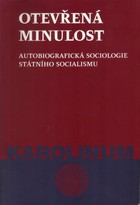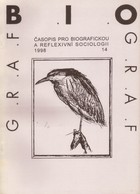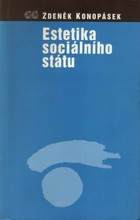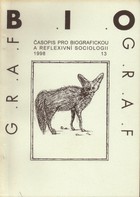Publikace, nahrávky a jiné výstupy
Přehled toho, co jsem napsal a zveřejnil (jako sociolog) nebo nahrál a vydal (jako muzikant). Prostě veřejně dostupné "výstupy". V případě, že je to právně a technicky možné, postupně sem dávám k dispozici i plné texty a do příslušných oddílů hudební sekce pak i nějaké hudební ukázky ve formátu mp3.

KONOPÁSEK, Z. (1999): Úvod k pěti studiím o auto/biografiích. In: Z. Konopásek, ed.: Otevřená minulost: autobiografická sociologie státního socialismu. Praha: Karolinum. Str. 53-56
::::

KONOPÁSEK, Z. (1999): Reflexivní autobiografie: interpretací post/komunistického Východu k porozumění post/modernímu Západu. In: Z. Konopásek, ed.: Otevřená minulost: autobiografická sociologie státního socialismu. Praha: Karolinum. Str. 353-369
::::

KONOPÁSEK, Z. (1999): Sociologie babičkou (po dvou letech). In: Z. Konopásek, ed.: Otevřená minulost: autobiografická sociologie státního socialismu. Praha: Karolinum. Str. 217-251
::::

KONOPÁSEK, Z. (1999): SAMISEBE: Pootevírání minulosti. In: Z. Konopásek, ed.: Otevřená minulost: autobiografická sociologie státního socialismu. Praha: Karolinum. Str. 7-19
::::

KONOPÁSEK, Z., ed. (1999): Otevřená minulost: autobiografická sociologie státního socialismu. Praha: Karolinum. 373 s.
::::

KONOPÁSEK, Z. (1999): Co je SAMISEBE? In: Z. Konopásek, ed.: Otevřená minulost: autobiografická sociologie státního socialismu. Praha: Karolinum. Str. 23-50
::::

DISMAN, M. / KONOPÁSEK, Z. (1999): Úvod k biografickým úryvkům SAMISEBE. In: Z. Konopásek, ed.: Otevřená minulost: autobiografická sociologie státního socialismu. Praha: Karolinum. Str. 255-257
::::

KONOPÁSEK, Z. (1998): Staré ortodoxie, nové ortodoxie: kvalitativní výzkum na prahu příštího století (review). Biograf , (14): 63-75
, (14): 63-75
::::Recenze knihy: DENZIN, N.K. (1997): Interpretive ethnography: Ethnographic practices for the 21st century. Thousand Oaks: Sage. 325 s. ISBN 0-8039-7299-7

KONOPÁSEK, Z. (1998): Estetika sociálního státu: O krizi reprezentace (nejen) v sociálním zabezpečení. Praha: G plus G. 341 s.
::::The book challenges the usual views of the welfare state which seek to explain its current difficulties in terms of economics, politics or ethics. Instead, it prefers the perspective which I call "welfare state aesthetics". By this term I mean a study of welfare institutions as a kinds of texts representing social phenomena that are to be coped with. These texts should be studied relatively independently of their authors' convictions or wishes as well as of social scientists' objective knowledge of the phenomena. The title term "aesthetics" indicates that it is presumed that realism of these institutional texts is based on artful illusion-making and on processes of translation from one text to another rather than on the mimetic mirroring of "real life". In the book, I use such a perspective for an analysis of social security benefit schemes. Benefit formula are seen and analyzed as texts that representing, in some way, the reality of "income insufficiency". It is argued that in the postmodern era, the universalism of these texts increasingly undermines their realism and vice versa. The tension between universalism and realism is at the core of what I mean by the term crisis of representation in social security. The representation crisis, of course, affects a wide range of social texts ranging from biographical constructions of identity to scientific constructions of truth. Thus, some aspects of the welfare state crisis may be understood against precisely this wider context.

ATKINSON, P. / SILVERMAN, D. (1998): Kunderova Nesmrtelnost: Interview society a vynalézání Já. Biograf , (13): 1-25 - přeložili Lukáš Gjurič a Zdeněk Konopásek
, (13): 1-25 - přeložili Lukáš Gjurič a Zdeněk Konopásek
::::Milan Kundera[a]s novel Immortality bears a dose relation to con temporary social science debates about the production of the self. Commentators like Kleinman and Mishler seem to have introduced a new version of authenticity based on a reinvention of the Romantic subject with the interview (as the medium) and the narrative (as the content) portrayed as the means for constructing and sharing biographical experience. Unlike such contemporary Romantics, Kundera examines how the subject is constructed in literary biography and mass media "imagology". The authors show how Kundera[a]s work leads in two possible directions: an analysis of the interview society and a concern with strategies for the invention of the self. By locating styles of the self, the authors reveal lively and skillful biographical work, overlooked by cultural critique and not reducible to any structural determinism.
ATKINSON, P. / SILVERMAN, D. (1997): Kundera's Immortality: The interview society and the invention of the self, Qualitative Inquiry, 3 (3): 304-325






